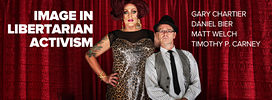Lead Essay
Prof. Gary Chartier praises the libertarian movement as a refuge for the eccentric, and for diverse experiments in living. From John Stuart Mill’s invention of that phrase down to the present day, libertarians have aimed to be the change they wish to see in the world — and quite often that means living an out-of-the-mainstream life. Chartier relates the tensions of modern-day libertarian activism to the familiar debate about “thick” versus “thin” libertarianism, in which the latter looks only at political freedom, while the former takes relatively more seriously the chains of social convention.
Response Essays
Daniel Bier welcomes a culture of freedom, but he warns that one key aspect of freedom is the ability to form associations based on shared norms, values, and procedures. Without the ability to form such associations, the social value of experiments in living will be much diminished, if it may even be said to exist at all. A radically uninhibited society will be unable to capture this value. Bier closes with a passage from Robert Nozick’s Anarchy, State, and Utopia in which Nozick praises the ability to form, dissolve, join, and leave communities that may have radically different values. This, the framework for utopia, may be called tolerant, but it does not impose a universal permissiveness.
Matt Welch looks at just what makes a political movement want to police its boundaries. He finds nothing wrong with telegenic, “normal”-seeming libertarians making the case as persuasively as possible before a national audience. But he also suggests that the history of weirdness in the libertarian movement… isn’t so weird at all, not when we consider how weird America itself actually is. All the American misfits out there may soon find that there’s a big tent that’s been ready and waiting for them. As old intra-libertarian infighting recedes in importance, a coalition of the squares and the freaks may take its place.
Timothy P. Carney asks whether traditional lifestyles are also welcome in the libertarian tent — or is it only the “alternative” ones? Carney distinguishes between cultural pluralism, which crafts policy so that people may craft their own rules for life, and cultural liberalism, which would impose liberal values on everyone, including those who desire to practice personally conservative ways of life. Libertarianism is at a crossroads, he argues; it now must choose between these two paradigms. Embracing cultural liberalism will alienate conservatives and may significantly shrink the never terribly large libertarian tent.
The Conversation
Related at Cato
Cato Unbound: “Libertarianism, Past and Prospects,” March 2007, with Brian Doherty, Brink Lindsey, Tyler Cowen, Virginia Postrel, and Tom G. Palmer; “Brain, Belief, and Politics,” September 2011, with Michael Shermer, Joe Carter, Eliezer Yudkowsky, and Ronald Bailey; and “Where Next? The Past, Present and Future of Classical Liberalism,” with Matt Zwolinski, John Tomasi, Roderick T. Long, David Friedman, and Alexander McCobin.
Podcast: “The Cato Institute and the Libertarian Movement,” with Edward H. Crane, May 4, 2015.

